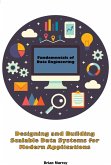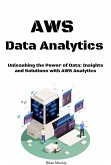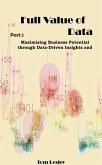"Fundamentals of Data Engineering: Building Robust Data Systems for Modern Analytics and Insights" is an essential guide for aspiring and experienced data engineers alike, providing a comprehensive overview of the principles, techniques, and technologies involved in designing and maintaining robust data systems.
In today's data-driven world, organizations heavily rely on data engineering to transform raw data into valuable insights. This book begins by introducing the fundamental concepts of data engineering and its vital role in the modern data landscape. It explores various data acquisition and ingestion techniques, including extracting data from diverse sources and real-time streaming.
The book delves into data transformation and processing, covering essential topics such as data cleaning, integration, and building efficient data pipelines. It also provides insights into different data storage and management approaches, including relational and non-relational databases, data modeling, and warehousing.
Ensuring data quality and governance is crucial, and this book equips readers with the knowledge and tools to assess data quality, implement governance frameworks, and adhere to privacy and security regulations.
Scalability is a significant concern in handling large volumes of data, and the book explores distributed computing, cluster frameworks, and resource management techniques to address scalability challenges effectively.
Data analytics and visualization play a vital role in extracting meaningful insights from data. The book covers exploratory data analysis, analytics techniques, and visualization tools, enabling readers to derive valuable conclusions from their data.
Monitoring and optimizing data pipelines are essential for maintaining efficient data systems. The book offers insights into performance monitoring, troubleshooting, and optimization techniques to ensure the smooth operation of data pipelines.
As cloud computing becomes increasingly popular, the book delves into cloud-based data engineering, discussing storage and processing services, serverless computing, and cost optimization strategies in the cloud environment.
Real-world case studies provide practical examples across various industries, showcasing how data engineering solutions are implemented and the lessons learned from those experiences.
The book concludes with a glimpse into future trends in data engineering, including emerging technologies and the impact of artificial intelligence and machine learning on the field.
Whether you are a data engineering professional seeking to expand your knowledge or a beginner looking to enter the field, "Fundamentals of Data Engineering" offers the essential guidance, best practices, and real-world insights needed to build robust data systems for modern analytics and insights.
In today's data-driven world, organizations heavily rely on data engineering to transform raw data into valuable insights. This book begins by introducing the fundamental concepts of data engineering and its vital role in the modern data landscape. It explores various data acquisition and ingestion techniques, including extracting data from diverse sources and real-time streaming.
The book delves into data transformation and processing, covering essential topics such as data cleaning, integration, and building efficient data pipelines. It also provides insights into different data storage and management approaches, including relational and non-relational databases, data modeling, and warehousing.
Ensuring data quality and governance is crucial, and this book equips readers with the knowledge and tools to assess data quality, implement governance frameworks, and adhere to privacy and security regulations.
Scalability is a significant concern in handling large volumes of data, and the book explores distributed computing, cluster frameworks, and resource management techniques to address scalability challenges effectively.
Data analytics and visualization play a vital role in extracting meaningful insights from data. The book covers exploratory data analysis, analytics techniques, and visualization tools, enabling readers to derive valuable conclusions from their data.
Monitoring and optimizing data pipelines are essential for maintaining efficient data systems. The book offers insights into performance monitoring, troubleshooting, and optimization techniques to ensure the smooth operation of data pipelines.
As cloud computing becomes increasingly popular, the book delves into cloud-based data engineering, discussing storage and processing services, serverless computing, and cost optimization strategies in the cloud environment.
Real-world case studies provide practical examples across various industries, showcasing how data engineering solutions are implemented and the lessons learned from those experiences.
The book concludes with a glimpse into future trends in data engineering, including emerging technologies and the impact of artificial intelligence and machine learning on the field.
Whether you are a data engineering professional seeking to expand your knowledge or a beginner looking to enter the field, "Fundamentals of Data Engineering" offers the essential guidance, best practices, and real-world insights needed to build robust data systems for modern analytics and insights.
Dieser Download kann aus rechtlichen Gründen nur mit Rechnungsadresse in A, B, CY, CZ, D, DK, EW, E, FIN, F, GR, H, IRL, I, LT, L, LR, M, NL, PL, P, R, S, SLO, SK ausgeliefert werden.









